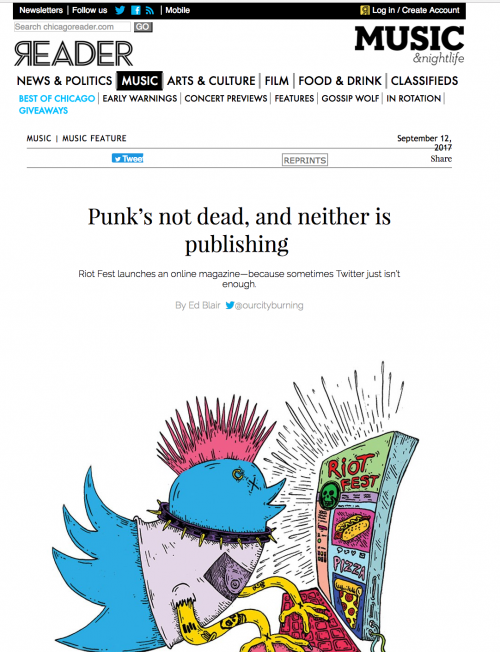“Punk’s not dead, and neither is publishing thanks to Alex White of White Mystery,” Chicago Reader
Posted Wednesday, September 13th, 2017 at 4:20 am
Asked to explain the logic behind launching Riot Fest’s online magazine, managing editor Ben Perlstein calls the approach “the reverse Pitchfork.” He explains: “They got the website and then the festival. We had a festival and then the website.”
Riot Fest founder Mike Petryshyn had been hoping to expand Riot Fest’s website for some time, and after Perlstein mentioned last winter that he’d been wanting to jump from artist management into a more creative career, Petryshyn offered him the editor’s chair at the new Riot Fest Magazine. Perlstein, former manager to Tommy Stinson and comanager of the reunited Replacements, had become close with Petryshyn while making the arrangements for the Mats’ 2013 reunion performances. By the time the magazine launched in earnest on April 1, 2017, former Reader staff writer Miles Raymer had come aboard as editor at large. “Miles Raymer is family, basically,” Perlstein explains. “Miles’s sister was Sean’s better half for about 15 years.” Sean McKeough, Petryshyn’s most important partner in the business of Riot Fest, died at 42 in late 2016.
The other main staff contributor to the magazine is Riot Fest’s creative director and social media manager. Also known as Riot Fest Twitter Guy (“We don’t don’t use his name in public,” Perlstein explains), this anonymous wit runs the Riot Fest Twitter account, which effortlessly pivots from promoting the festival to smacking down queries about its lineup to helping folks land dates or get dogs adopted. It’s one of the great Chicago Twitter accounts, hitting the sweet spot between gruff and generous that’s a trademark of the city.
“Riot Fest Twitter Guy really set the tone for the website when he became Riot Fest Twitter Guy,” says Perlstein. “The kind of snarky ‘I know more than you but I’ll share it with you’ vibe.”
Perlstein elaborates on the in-house dynamic: “The people that Mike surrounds himself with, like me and Riot Fest Twitter Guy and Miles—we all get it. We all get what Riot Fest is about, and the tone, and we make sure that the people that are writing are on board with that.” Raymer solicits and coordinates freelancers, Perlstein edits (making sure the copy fits the house style), and Riot Fest Twitter Guy “writes all those wacky articles like manatees farting and stuff.” This is Perlstein’s first job as an editor, and while he admits that a lot of his current process is “trial and error, seeing what works,” he also notes that Petryshyn had never run a music festival when he founded Riot Fest.
So far Riot Fest Magazine’s content has included listicles about festival acts and their side projects, updates on the Lake Michigan Bat Creature, and a DIY advice column by Alex White of White Mystery, which takes a practical and battle-tested look at punk praxis. Perlstein hopes to have more contributions from artists in the future, drawing on the festival’s established relationships with hundreds of acts—he mentions an upcoming feature with Angelo Moore from ska-punk band Fishbone, where he’ll discuss the song “Subliminal Fascism” (from the 1988 album Truth and Soul, which the band will play in its entirety on Saturday) in light of the Reagan-era political climate that spawned it and today’s Trumpian shitshow.
Riot Fest Magazine doesn’t have many editorial mandates, but Perlstein does bring up one. “We try to stay apolitical,” he says. He decided not to run an article that compared Trump GIFs to a Hitler documentary on Netflix, for instance. “We’re not going to talk about it, but we’ll let Angelo from Fishbone talk about it. We’ll give him a voice.” This is a strange position for an editor to take in 2017, especially one working for an operation that’s already so pointedly confrontational on Twitter, but as Perlstein talks about the future of Riot Fest Magazine, its desire to maintain political neutrality begins to make sense. Alienating almost half of your festival’s potential audience is a bad play.
Perlstein says emphatically that this is just a start. He promises special content during the festival—the magazine will have access to many of the performers—but he’s cagey with details. He hopes to build a portal similar to Vice or the A.V. Club, with recurring features, video content, and more. “We want to get to a place like that, but we’re not in any rush,” he says. “It’s not advertiser driven. It’s basically our own advertisement. So we get to control the narrative.” The primary goal of Riot Fest Magazine, as he makes clear, is selling Riot Fest. That’s the biggest difference between it and the outlets Perlstein aspires to compete with—they’re ostensibly journalistic outlets first. For Perlstein and Riot Fest Magazine, though, “It all ties back to the festival.” v
By submitting a comment here you grant White Mystery a perpetual license to reproduce your words and name/web site in attribution. Inappropriate or irrelevant comments will be removed at an admin's discretion.








